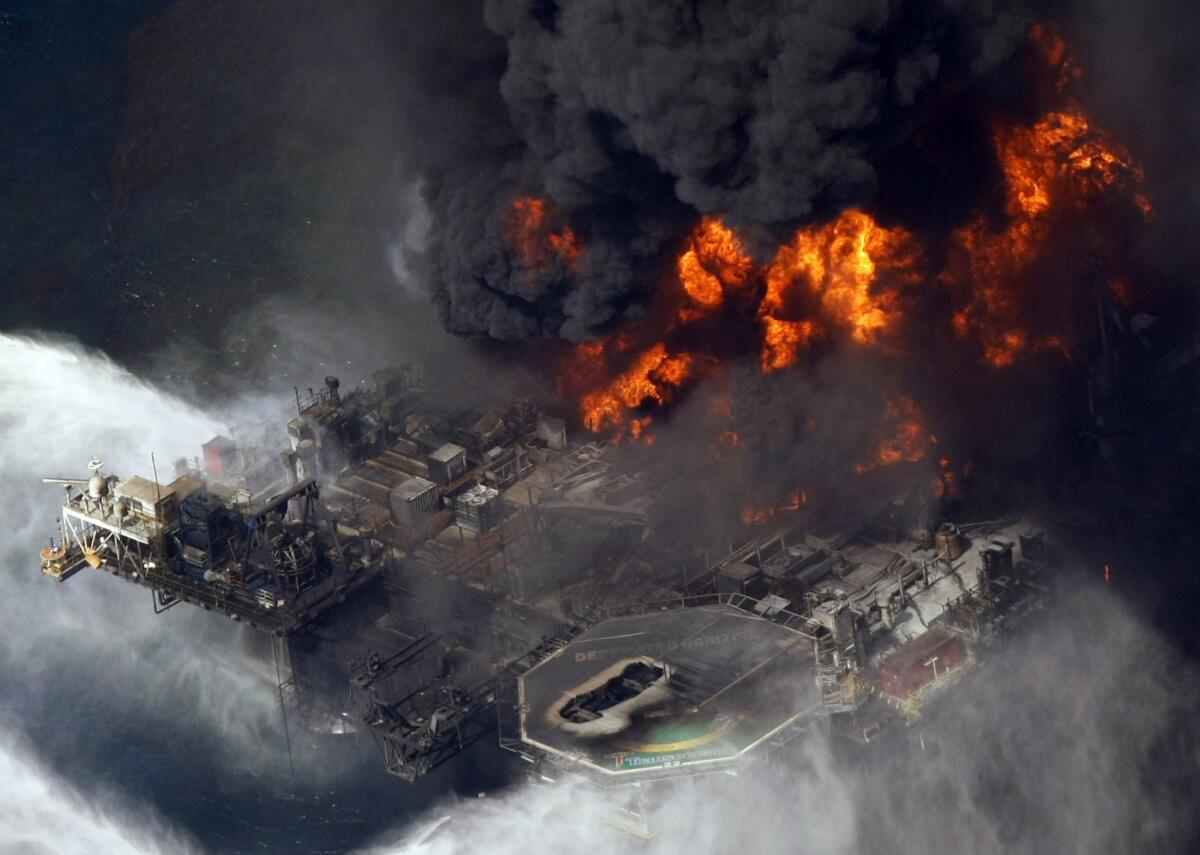The Supreme Court ends BP’s campaign to kill its gulf oil spill deal

- Share via
For almost a year, we’ve been chronicling BP’s efforts to undercut a damage settlement deal its own lawyers helped craft for victims of its record-setting 2010 Deepwater Horizon oil spill disaster in the Gulf of Mexico.
So it’s proper to note that on Monday the Supreme Court put an end to this ridiculous campaign by turning down the company’s appeal of a lower court ruling against it. The denial of BP’s petition came in one sentence, without dissent.
As we’ve reported, the case involved a class-action settlement BP agreed to in 2012. According to the deal, certain businesses claiming economic losses from the spill, such as hotels and restaurants, would only have to demonstrate a given pattern of losses--such as downturns that started right around the time of the spill and gradually recovered--to have their claim paid, without making a clear case that the losses stemmed directly from the oil. The idea was to streamline the claims process, so every victim wouldn’t have to bring a case before a judge and jury at great expense to them and BP alike.
Soon after the deal went into effect, BP tried to wriggle away from it. The firm asserts that some claimants couldn’t show causation, even though its own lawyers had acknowledged from the start that such an outcome would naturally result from lowering the claims bar.
The oil giant rolled its big guns into federal courthouses, placed ads in major newspapers, and snagged a hugely sympathetic article in BusinessWeek. Then, in May, it struck a PR gusher (so to speak): a big story on “60 Minutes” that all but took its position as gospel.
Oh so annoyingly, however, BP was much less successful in court than on “60 Minutes.” Its pleas to overturn the 2012 settlement ultimately were rejected by a federal judge and by two panels of the U.S. Court of Appeal. The Supreme Court appeal was its last gasp, and now it has to slink away.
BP’s incentive for undermining its own deal isn’t clear, though it may have something to do with the scale of the claims, which may be larger than it expected. As of Monday, claims administrator Patrick Juneau has received about 291,000 claims. He’s not exactly a rubber stamp: He’s paid about 73,000 claims for a total of $4.3 billion, and rejected about an equal number. The others are pending judgment, have been withdrawn, or are awaiting more paperwork. The flow of damage payments was shut down for months by BP’s litigation campaign. The company has the right to appeal any award, and so far it has done so in nearly 5,400 cases.
BP still insists it’s getting mulcted by conniving business owners in the gulf region. In a response last February to my original post on its efforts, it denied that it’s waging an “assault on the settlement,” as I described it, but “fighting to return the settlement agreement to its clear, lawful and intended purpose: the compensation of claimants with actual losses due to the spill.”
On Monday, following the Supreme Court ruling, it pledged to “continue to advocate for the investigation of suspicious or implausible claims and to fight fraud where it is uncovered.” If that means it’s going to try to subject every claim to a challenge, then it’s pursuing exactly the course it agreed to avoid via the original 2012 deal.
Keep up to date with the Economy Hub. Follow @hiltzikm on Twitter, see our Facebook page, or email [email protected].
More to Read
Inside the business of entertainment
The Wide Shot brings you news, analysis and insights on everything from streaming wars to production — and what it all means for the future.
You may occasionally receive promotional content from the Los Angeles Times.











